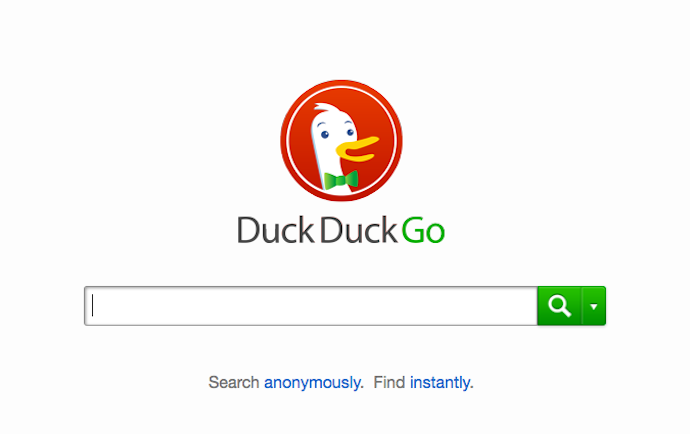Duckduckgo Offers Anonymity In A Web Of Stolen Identity


DuckDuckGo is looking more attractive by the moment. Traffic to the upstart search engine had more than 3.1 million direct hits on June 18, setting a new record for the site. Duckduckgo continues its rise since news of the federal government’s PRISM Web surveillance program broke June 6. Alarmed that the National Security Agency has obtained access to detailed user information from tech companies including Google, Apple, Microsoft and Facebook, consumers are looking for ways to conserve their online anonymity and are flocking to DuckDuckGo, which doesn’t record customer information.
Leading search engines, including Google and Bing, track users’ search behavior and share the data with advertisers. But through the various avenues now recording and sharing data—Google, Yahoo, Microsoft, Facebook, Apple, etc.—researchers now believe individual profiles can be built by piecing together data.
How can these sites obtain your data? Every time you click on a link from Google, for example, your search term is reported to your destination site and tagged to your location and IP address, which can often be traced directly to you. The information is also available to third-party advertisers that in turn build user profiles, allowing similar ads to seemingly follow users across the Web.
Not only are users likely to become caught in a loop of targeted ads, but research has shown they can be directed to higher prices. Less than a year ago Orbitz Worldwide actually found that Mac users pay as much as 30 percent more per night on hotels purchased than Windows users pay. According to the Wall Street Journal, Orbitz used that interesting tidbit as the basis for displaying Mac users different—and more expensive—travel options than are shown to Windows users, demonstrating a perfect example of how online tracking can be used to predict consumers’ behavior. Insurance companies are also delving into consumers’ online shopping activity, magazine subscriptions, hobbies and even social network activity to predict customers’ future health risks. In fact, the US arm of British insurer Aviva PLC found evidence that “predictive modeling” based partly on consumer marketing data could mimic traditional methods.
Our online “profiles” aren’t only used in marketing efforts, however. Remember that search history Google saved? Those searches can be legally requested—in court or by police, for example—and interpreted in whatever way a shark DA sees fit.
When they’re pieced together, all those bits of data can be used to make some pretty strong assumptions about an individual, accurate or not. And there’s plenty of ways those profiles can get into the wrong hands: Most privacy policies openly admit user information will be surrendered upon court order. Or a Google employee could get pissed at the world and cyber stalk you. What if Google were to be hacked?
DuckDuckGo, on the other hand, doesn’t store any personal information, so it doesn’t have any data to sell or relinquish to the government. And the few ads you’ll find on the search engine are targeted at the current search words and nothing more.
Privacy may be the reason searchers are flocking to DuckDuckGo now, but the search engine’s lack of records can serve an even greater purpose. By storing data on recent searches from your IP address, as well as shared information from social networks and shopping sites, Google personalizes its searches. Your results from a search of a certain term may be markedly different from your neighbor’s. The results are even customized based off of previous clicks.
So what does this “filter bubble” do? Since people are likely to have clicked on topics of interest or agreement, they end up seeing more and more search results of shared opinions. And many wonder why Americans are so polarized in their beliefs… Google makes sure we hear from those we agree with, leading us all to think we’re the experts and in the majority on any search topic.
In his Amazon review of “The Filter Bubble: What the Internet Is Hiding from You,” Benjamin Wikler described how personalized Internet services such as Google and Facebook “can put you into a ‘you loop,’ in which they show you what you think you want, and then you wind up wanting those things more because you see them more often.”
Because of sites’ data collection, the Internet has become a giant paradox. The World Wide Web was developed so—for the first time—information could be freely available to all. But now, because of our reliance on it, the Internet is limiting our exposure to opposing ideas. DuckDuckGo, however, promises to bust the Filter Bubble wide open and prevent leakage of search data by routing all search requests so your search term isn’t shared with other sites. And its encrypted version even changes links from major Web sites—including Wikipedia, Facebook, Amazon and Twitter, among others—so they direct to their encrypted versions.
Although DuckDuckGo provides millions of searches per month compared to Google’s billions, it could very well be the next big thing in terms of Internet evolution. As more studies show us just how little online anonymity we have anymore, users are sure to grab hold of emerging options such as DuckDuckGo and tell “Big Brother” to get out of their asses.









































